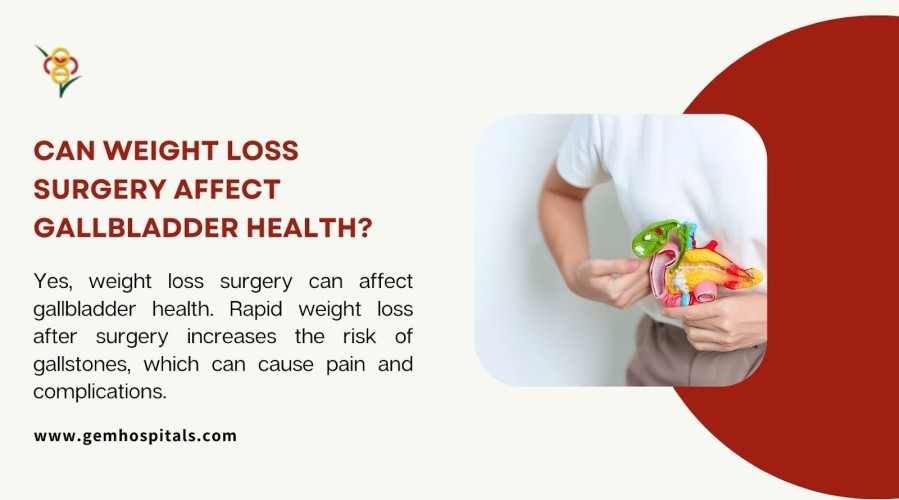Learn effective solutions for digestive problems with expert tips to improve gut health, reduce discomfort, and maintain a healthy digestive system.
Can Weight Loss Surgery Affect Gallbladder Health

The procedure of weight loss surgery, commonly called bariatric surgery, is an effective strategy for morbidly obese people. It has many benefits to health, including better heart health, better diabetes management, among others. However, as it is widely recognized that the kidney is a major and sensitive organ, it raises similar concerns as those seen in other major operations done on the body, and one of them is how it affects gallbladder health. You may be wondering: can weight loss surgery lead to issues in the gallbladder?
In this blog post, we’ll explore how weight loss surgery affects the gallbladder, why complications can happen, and how you can safeguard yourself.
Why Weight Loss Surgery Affects Gallbladder Health
Weight loss surgery often results in rapid weight loss, and this condition causes the formation of gallstones. When the body loses weight, cholesterol levels in the bile may increase and form gallstones.
Data from some studies indicate that between 30-50% of patients who have had bariatric surgery will experience gallstone formation during the first two years following the operation. These stones can trigger symptoms such as:
Abdominal pain
Nausea or vomiting
Indigestion
Fever (in cases of infection)
Some may even get cholecystitis, inflammation of the gall bladder that will lead to surgery to have the organ removed.
Types of Weight Loss Surgery and Their Impact on Gallbladder Health
The risk of gallbladder problems after weight loss surgery varies depending on the type of surgery performed:
- Gastric Bypass: This surgery bypasses a section of the digestive system and results in quick weight loss. This can greatly raise the chances of getting gallstones.
- Gastric Sleeve: In this procedure, the surgeon either partially or fully bypasses the stomach to limit the amount of food consumed. While it also causes rapid weight loss, the likelihood of gallstones might be somewhat lower than in the case of gastric bypass.
- Gastric Band: It is more likely to produce slow weight loss and therefore the risk of gallstones may be lower than if a more radical surgery is carried out.
Preventing Gallbladder Issues After Weight Loss Surgery
While the risk of gallbladder issues is real, there are steps you can take to reduce it:
- Slow and Steady Weight Loss: Even though weight loss surgery helps patients achieve a great deal of weight loss in a short period, adhering to your doctor’s advice on the rate of weight loss can help reduce your chances of developing gallstones.
- Medications: Some doctors use ursodiol after surgery to prevent the formation of gallstones. This can be a good preventative measure particularly for those with higher risk of the disease.
- Dietary Changes: Low fat diet has to be followed strictly after the surgery has been performed. Fatty meals are especially dangerous for the gallbladder so try to eat healthy meals that help you achieve your goal but also would not harm your gallbladder.
- Regular Monitoring: Follow up exams are mandatory. These gallbladder problems can be detected early before they become severe if there is frequent check-up.
When to Seek Help
If you have ever been a candidate to weight loss surgery, you should consult a doctor immediately if you develop signs such as acute abdominal pain, vomiting, or fever. Gallstone formation is a common problem and can cause complications if not treated. An ultrasound can determine whether you have gallstones or any other gallbladder condition. In certain circumstances, the gallbladder may be removed.
Even though weight loss surgery is a life altering intervention its use is associated with an increased risk of developing gallbladder complications. Low-calorie diets result in the formation of gallstones, but these complications can be prevented or treated by following a doctor’s advice.
If you are a candidate for weight loss surgery, consult the staff of Gem Hospital on how this operation affects the gallbladder and what measures can be taken to prevent this. This way, you will understand what you are up against and how to protect yourself as you begin your weight loss program. For more detailed information or to make sure you are doing everything right, feel free to schedule an appointment today!
Blogs & Article
Explore current research trends in digestive health, including new treatments, advanced diagnostics, and innovations improving gut health and patient care.
Discover common digestive health myths and the real facts. Learn simple tips to improve gut health and maintain better digestion for a healthier life.


